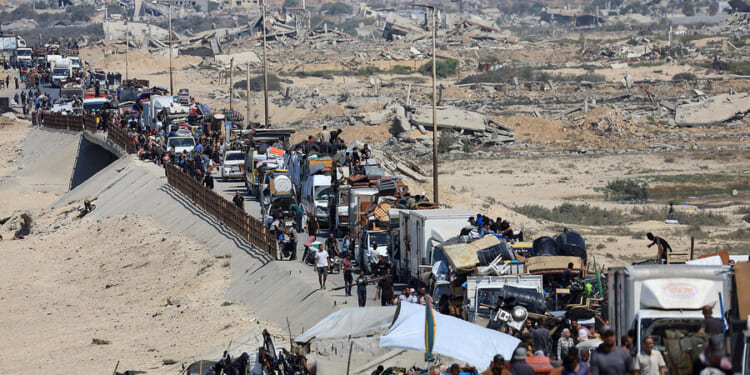After a harrowing eight-hour evacuation from Gaza City, Mohammed al-Rai, a father of five, returns to a familiar challenge: the hunt for food.
But he is finding it harder than ever to feed his family, he says.
He does not have enough money to buy food in the market, nor does the local charity kitchen near his new home – a makeshift tent – have enough food for him. He just has to wait and see whether a relative can spare him any leftovers.
Why We Wrote This
More food is reaching Gaza now but barely enough to stave off famine amid the chaos of forced displacement, which was ordered by the Israeli army.
Some days, Mr. al-Rai’s children eat; other days, they wait in line for a meal handout that never arrives.
“Today, you may get something, tomorrow, nothing,” Mr. al-Rai says, a few days after fleeing an Israeli army offensive in Gaza City with his family in a truck hastily packed with their last belongings. “Now, the suffering cannot be described.”
As several Western nations moved to recognize a Palestinian state, and as U.N. Secretary-General António Guterres called for the implementation of measures ordered by the International Court of Justice to halt fighting as part of an ongoing genocide case against Israel, Gaza’s residents face an ever-deepening crisis.
Just as the amount of food flowing into Gaza began to increase, stoking hopes of turning back an impending famine, Israeli forces launched an all-out assault on Gaza City. That assault once again disrupted the distribution of lifesaving aid, threatening to plunge the enclave back into starvation.
Displaced Palestinians say it adds a new level of desperation among families accustomed to hardship.
More aid, less access
The contradiction at the heart of Gaza’s hunger crisis is stark.
On paper, aid deliveries are rising; in practice, bombardments, displacement, and collapsing infrastructure mean families still go hungry.
Earlier this month, the U.N. Office for the Coordination of Humanitarian Affairs reported an uptick in hot meals, with 558,000 daily meals distributed by 20 partner organizations across the Gaza Strip.
Communal kitchens run by local women and international nongovernmental organizations were operating again by late August, acting as lifelines for displaced families who can no longer afford to buy food.
Yet, the Israeli military offensive, which the army says is aimed at rooting out Hamas fighters, has disrupted aid distribution in northern Gaza.
The shocks of the offensive, the influx of tens of thousands of displaced Palestinians into central and southern Gaza, and the disruption in aid distribution have led the price of food in the markets to skyrocket.
The U.N. reports that more than 200,000 Palestinians have been pushed from northern Gaza to southern Gaza by the Israeli military campaign since Sept. 1, with 20,500 displaced on Tuesday alone.
Food might be entering Gaza in greater quantities than it did before U.N. experts declared a famine in Gaza in August, but tens of thousands of people repeatedly on the move are finding that food is increasingly hard to get their hands on.
Each time a family flees, its members leave behind the local charity kitchen or humanitarian distribution point on which they had depended. At the other end of their journey, they arrive in towns or camps where aid is already stretched thin.
Since Sept. 12, Israel has closed the Zikim crossing, a key way station in the aid lifeline into northern Gaza. That has prevented U.N. agencies and their NGO partners from bringing any food into Gaza City, where hundreds of thousands of civilians remain, despite the fighting.
Meanwhile, humanitarian workers report disruptions to internet and landline services in northern Gaza, interrupting telecommunications across the enclave, further straining efforts to get food to people who need it.
Four people, including one child, have died from hunger this week, according to Gazan health authorities – raising the total number of Palestinian deaths from hunger to 440.
Even when food is technically available, barriers mount.
Israel’s intermittent cuts to Gaza’s internet and phone networks have paralyzed the digital payment systems that many Palestinians have come to rely on, because of the shortage of cash in the Strip.
Families accustomed to receiving remittances from abroad have suddenly found themselves unable to withdraw cash, leaving them without the money to purchase groceries.
“When the internet goes down, we can’t buy food,” explains Mr. al-Rai. “All we think about is how to eat? How to drink?”
In Deir al-Balah’s Shurrab camp – one of several makeshift displacement sites in central Gaza – Mr. al-Rai relies on his aunt, Um Mohammad, a camp representative.
Each day, World Central Kitchen, a charity, sends a single large pot of food to feed 50 families, which Um Mohammad distributes. This food is reserved for Palestinians displaced before the current Israeli offensive and is not enough to feed new arrivals.
When a family is unable to collect its share, she quietly sets aside an extra portion for the al-Rai household.
“Before people from Gaza City started moving south, I used to give each family a full pot of rice or whatever the kitchen provided,” Um Mohammad says. “Now, with so many more people arriving, I can only give each family one plate.”
As the weeks drag on and the displaced population swells, even that is hard to ensure. “The quantity is the same,” Um Mohammad says, “but the number of people keeps increasing.”
The war has turned the search for food for families such as Mr. al-Rai’s into a daily lottery.
Left with nothing
Compounding Gaza’s man-made hunger crisis are the steep costs and the loss of money and belongings faced by the tens of thousands of Palestinians ordered by the Israeli military to move south.
With transport by car costing up to $1,400 to move a family from Gaza City to central Gaza, people are arriving with little more than the clothes on their backs – and finding food handouts scarce.
Mr. al-Rai relied on remittances from relatives abroad to pay for his family’s evacuation.
Qamar al-Ghandour and her family were forced to abandon their makeshift tent in Gaza City and head south to Deir al-Balah as the Israeli offensive against Gaza City intensified and food supplies dried up.
The journey south was expensive. Ms. al-Ghandour sold her phone and wedding ring to pay nearly $1,000 for the trip.
“When the occupation of Gaza City was announced, everything stopped – kitchens, aid, all of it,” Sanaa al-Ghandour, Ms. Ghandour’s mother-in-law, says. “Life there became impossible.”
Now in Deir al-Balah, the family remains without a tent or tarp of their own. They cannot find an aid distribution point with enough food for them. Family members injured when their tent was struck by an Israeli missile in July require ongoing care, but clinics are overwhelmed.
“We lost our home, our belongings, even our tent,” the elder Ms. Ghandour says. “My money has run out. We have nothing left.”













